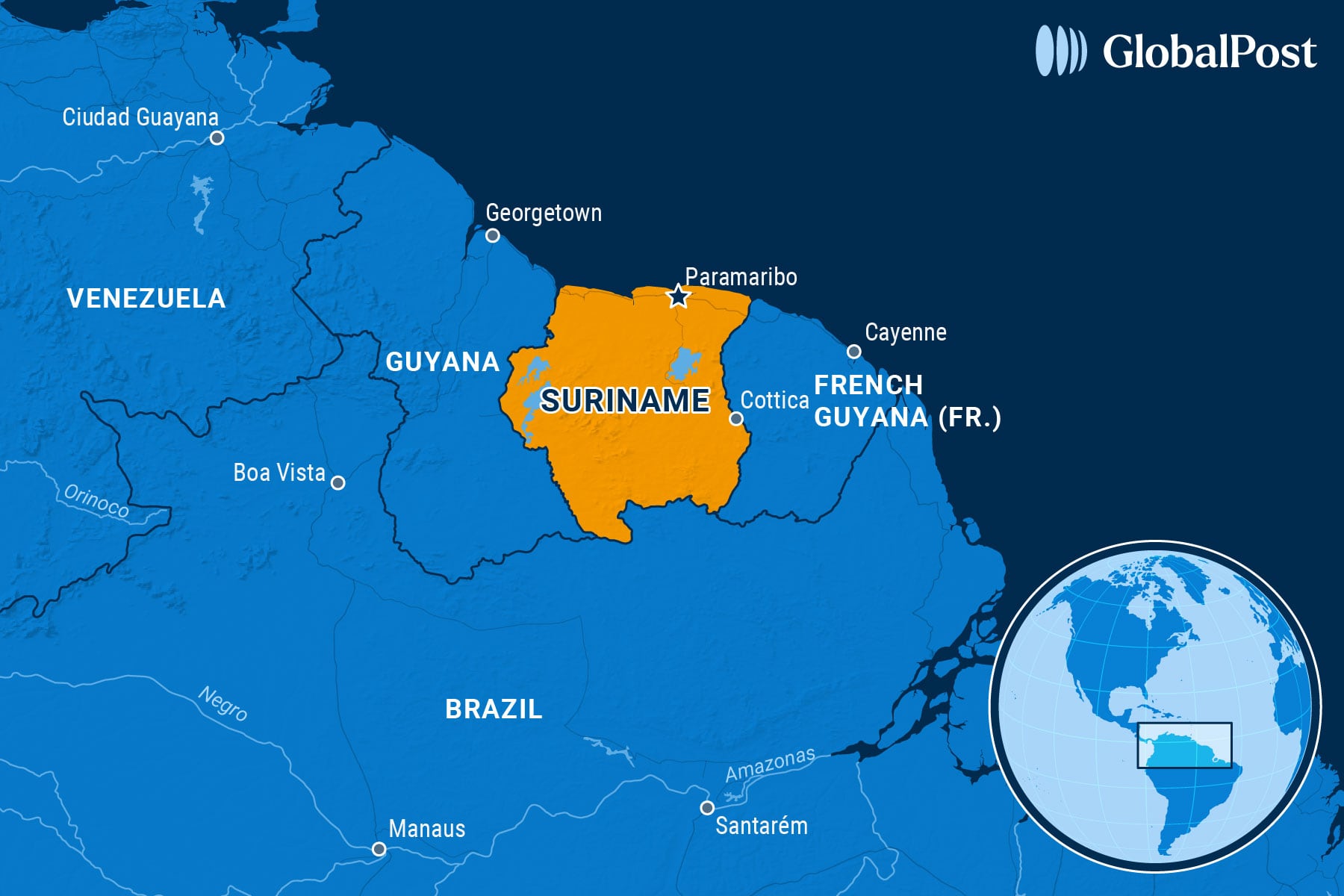New Dawn: Suriname Tries To Put Its Past Aside
NEED TO KNOW
New Dawn: Suriname Tries To Put Its Past Aside
SURINAME

Dési Bouterse, the former leader of Suriname, died recently. But analysts say his shadow will haunt the country for years to come.
The 79-year-old became president after leading the army’s coup in the former Dutch colony in 1980. Seven years later, he stepped down after coming under international fire for inciting political violence, reported Agence France-Presse. In 1990, he returned to power in a bloodless coup but resigned a year later. In 2010, voters elected him president, a position he held for a decade, transforming himself into a dictator while becoming the subject of national and international arrest warrants for murder and drug-trafficking.
As some in the South American country continue to mourn Bouterse, others say Suriname is trying to put its past in the rearview mirror.
“Now that Bouterse has passed away, it might be worth investigating whether it makes sense to start a process of truth-finding, as happened in South Africa after the apartheid regime fell,” wrote Suriname’s local newspaper, de Ware Tijd, referring to the political murders of hundreds of people under the Bouterse regime. “Suriname’s development will be able to proceed more quickly if there is a certain degree of unity among the population.”
The country of almost 700,000 people, one of the most diverse in the world, is now hoping to see the fruits of exploiting a treasured resource that lies off its Atlantic shores. As OilPrice.com reported, leaders in Suriname are now hoping to mimic neighboring Guyana, where the gross domestic product per capita increased 41 percent last year to almost $31,000 annually, more than four times greater than Suriname’s $7,600 per capita.
The recent approval of the $12.2 billion, 1.4 million-acre GranMorgu project in Suriname is expected to deliver similar windfalls. By 2028, the project is expected to pump as much as 220,000 barrels per day from offshore fields containing 760 million barrels in total, added Offshore Energy.
GranMorgu, incidentally, is a word for a massive grouper fish but also has a double meaning – “great morning” or “new dawn” in the local Sranan Tongo language, said French oil company TotalEnergies in a statement.
Meanwhile, drillers have already generated more than $300 million a year for Suriname’s treasury for three years in a row – a previously unheard-of haul there, noted Radio Jamaica News.
Surinamese hope to have a say in how the country spends the money. As BNamericas wrote, politicians and activists are calling for greater transparency and public oversight of the oil industry. Campaigns for the general election on May 25 already include demands for the government to dole out larger tranches of oil revenues to communities and interest groups.
Held under new rules that will foster new political parties to enter parliament, the election is still a battle between President Chan Santokhi’s Progressive Reform Party and the late Bouterse’s National Democratic Party, the Center for Strategic and International Studies explained.
US Secretary of State Marco Rubio’s visit to the country in April before the vote was a sign of how powerbrokers in the Western Hemisphere also see the country’s potential. “Energy security in the Caribbean region,” was a major talking point during Rubio’s meeting with Santokhi.
Meanwhile, the country is struggling with its economy, left bankrupt by the former president, corruption, and balancing its relations with China with new interest from the US, wrote Global Americans.
Regardless, Suriname can expect big changes in the coming years. How they manage these changes is the tricky part, say analysts.
Suriname has seen similar promises of economic growth through oil exploration for a decade now,” wrote Semafor. “People are still waiting.”
THE WORLD, BRIEFLY
Lithuania Takes Belarus to Court For ‘Weaponizing’ Migration
LITHUANIA

Lithuania filed a complaint against Belarus with the International Court of Justice (ICJ), charging its Eastern European neighbor with orchestrating a migrant crisis by smuggling people across their shared border, Al Jazeera reported.
“We are taking this case to the International Court of Justice to send a clear message – no state can use vulnerable people as political pawns without facing consequences under international law,” said the Baltic country’s justice minister, Rimantas Mockus.
Lithuania, which is also seeking financial compensation for damages caused by human trafficking, says attempts at bilateral talks on the issue with its neighbors have failed.
Lithuanian officials, meanwhile, say they have proof of Belarus’ direct involvement in the migrant flows, including an increase in flights from the Middle East operated by airlines owned by the Belarusian state. After the flights landed in Belarus, they added, numerous passengers were transported to the Lithuanian border by Belarusian security forces and forced to cross illegally.
Tensions between Lithuania and Belarus relating to migration have been ongoing since 2021, when thousands of migrants, mostly from the Middle East and Africa, started appearing at Belarus’ borders with Lithuania, Poland, and Latvia, wrote Euronews.
Meanwhile, a 2021 Human Rights Watch report accused Belarus of manufacturing a migration crisis and Belarusian border guards of human rights violations.
European Union officials have also accused Belarus, a close ally of Russia, of “weaponizing” migration in an attempt to destabilize the bloc, allegations rejected by Minsk.
In December, the EU passed emergency measures to allow member states bordering Belarus and Russia to temporarily halt asylum rights in instances where migration is being exploited for political purposes.
Former Congolese Leader To Do Hard Labor For Corruption
DEMOCRATIC REPUBLIC OF THE CONGO

The Democratic Republic of the Congo’s (DRC) constitutional court this week sentenced a former prime minister to 10 years of hard labor on embezzlement charges, in a high-profile case brought by the administration of President Félix Tshisekedi against his predecessor’s government, Reuters reported.
On Tuesday, the court found former Prime Minister Augustin Matata Ponyo guilty of embezzling approximately $245 million in public funds, along with Deogratias Mutombo, former governor of the central bank, and South African businessman Christo Grobler.
Mutombo and Grobler each received five-year sentences of hard labor. All three were tried in absentia and remain at large, according to the newswire.
The charges stem from the misappropriation of funds meant for the Bukanga-Lonzo Agro-Industrial Park, a large-scale agricultural project launched under former President Joseph Kabila.
The initiative aimed to reduce food insecurity and create jobs, but it collapsed in 2017. Three years later, Congolese authorities under Tshisekedi discovered that funds were stolen from the project and initiated a probe over the previous government’s conduct, the BBC wrote.
Matata, who served as prime minister from 2012 to 2016, has denied any wrongdoing. His lawyer condemned the verdict as politically motivated.
Following the ruling, both Matata and Mutombo have been barred from holding public office for five years.
EU Approves Funding to Keep US News Site Afloat
EUROPEAN UNION

The European Union on Tuesday agreed on emergency funds to help keep Radio Free Europe/Radio Liberty (RFE/RL) operational after the Trump administration cut grants to the government’s pro-democracy media outlet, accusing it of having a liberal bias, the Associated Press reported.
According to EU foreign policy chief Kaja Kallas, the bloc’s foreign ministers agreed to a $6.2 million contract to “support the vital work” of RFE/RL. The “short-term emergency funding” is a “safety net” to safeguard independent journalism.
While the EU is not able to fill the outlet’s funding gap worldwide, Kallas said that the bloc can help RFE/RL – which started broadcasting during the Cold War to counter Soviet propaganda – to “work and function in those countries that are in our neighborhood and that are very much dependent on news coming from outside.”
This emergency fund is a short-term solution, but Kallas said she hoped the 27 EU members would provide more money to sustain RFE/RL in the long term. Sweden said earlier this month it would donate about $2 million to the media outlet, according to Reuters.
A US judge also ordered the Trump administration to restore a $12 million payment to RFE/RL for the month of April for the damages caused by the cuts, the Washington Post wrote.
DISCOVERIES
Queen of the Beat
It’s been more than a decade since Ronan the sea lion made waves with her uncanny ability to bob along to a beat.
In 2013, the marine creature became a sensation with her ability to groove to the sounds of “Boogie Wonderland.”
While some skeptics believed that her performance was a fluke, a new study shows that Ronan doesn’t just have rhythm but that she has gotten even better at grooving to a beat, even outperforming humans.
To discover this, scientists at the University of California, Santa Cruz, who say that years of training has made the now-16-year-old sea lion an expert at keeping to the tempo, conducted experiments: They tested the sea lion’s musical abilities against 10 UC Santa Cruz students, who were asked to wave their arms in sync with percussive beats at 112, 120, and 128 beats per minute (bpm).
Ronan had only trained with 120 bpm before and the other tempos were new.
But that didn’t stop her from trouncing the competition: The team noticed that, at her best tempo, she consistently hit within 15 milliseconds of the beat – a human blink takes about 10 times longer.
“She is incredibly precise, with variability of only about a tenth of an eyeblink from cycle to cycle,” lead author Peter Cook explained in a statement. “She’s basically hitting the rhythmic bullseye over and over and over again.”
Still, that performance puts the sea lion in the 99th percentile of modeled human beat-keeping, raising important questions about the cognitive mechanisms behind rhythm perception.
For years, researchers believed that beat synchronization required vocal learning – the ability to mimic sounds – which sea lions don’t have.
But Ronan’s skills show that this ability may not be limited to vocal learners, suggesting rhythm perception may be more widespread in the animal kingdom than previously thought.
Her success also highlights how training, experience, and cognitive flexibility play a critical role in rhythm perception. The sea lion trained in roughly 2,000 short sessions over the years, showing how rhythm skills can be built up gradually – much like they are in humans.
Even so, the authors emphasized that Ronan’s training was not intense, adding that her rhythm exposure is far less than that of a typical human child.
“No human was better than Ronan at all the different ways we test quality of beat-keeping,” Cook told the Associated Press, adding that “she’s much better than when she was a kid.”
